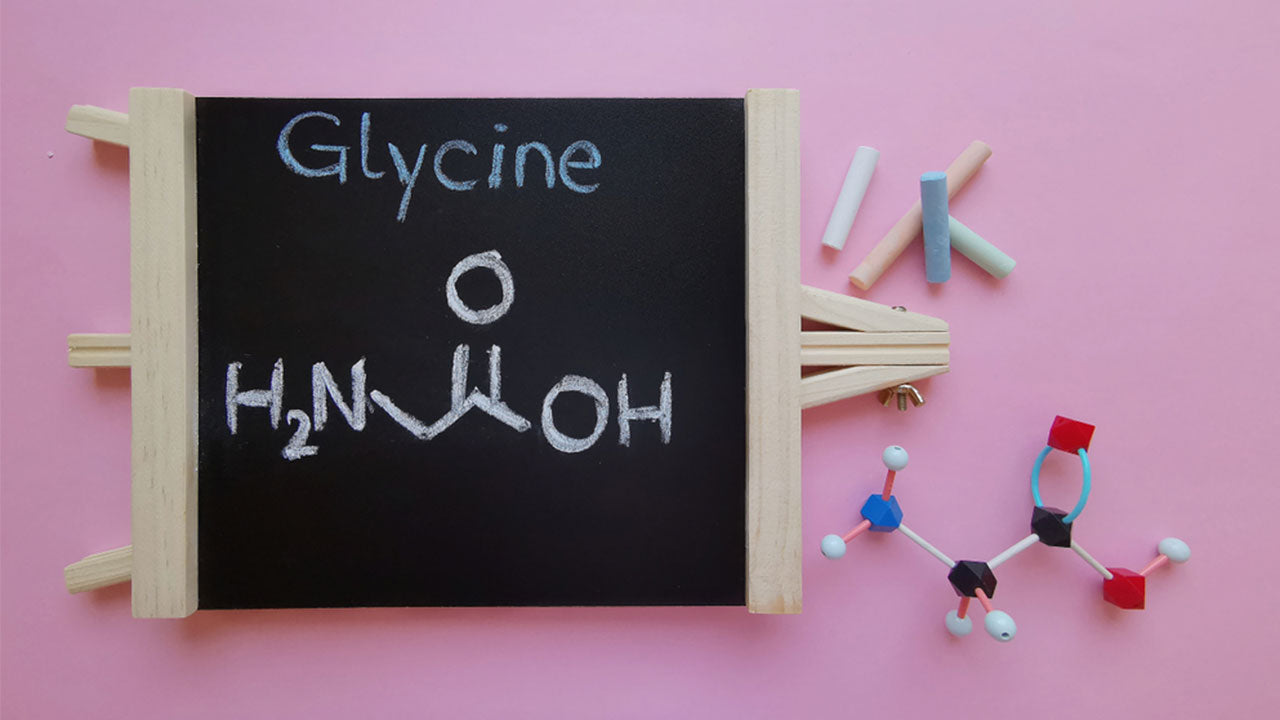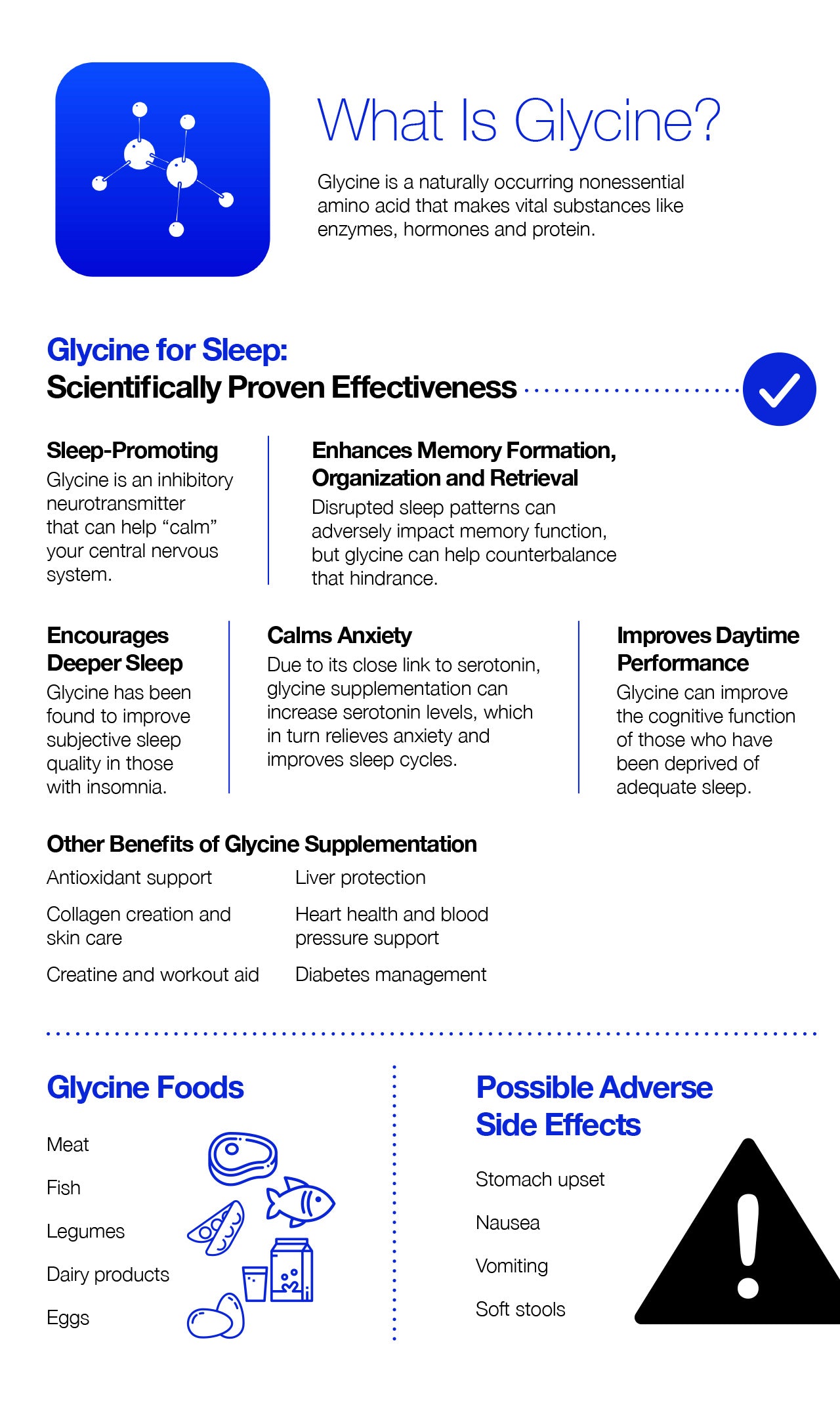Glycine for Sleep: The Amino Acid for Better Rest
 By: by Amino Science
By: by Amino Science

Amino acids are the building blocks of protein, which probably makes you think of all things muscle, like muscle repair and new muscle creation. You do need all nine essential amino acids to build muscle, but amino acids perform a wide variety of important tasks in the body, including regulating your sleep-wake cycle and the quality of sleep you experience. Glycine is one of those amino acids working tirelessly behind the scenes so that you can get a good night's sleep. We have the details on the effects of glycine for sleep, and how you can utilize it to optimize your sleep patterns.
What Is Glycine?
Glycine is a naturally occurring nonessential amino acid. It is the simplest in structure of all the amino acids, and yet it's just as important in daily functioning. Glycine is used to make vital substances like various enzymes and hormones in the body, and it's also used to synthesize new protein, a role it plays in muscle maintenance and growth.
The human body naturally produces glycine, but it's also found in protein foods and can be taken as a dietary supplement. While glycine deficiency is extremely rare, studies have shown that low levels of glycine are associated with the development of type 2 diabetes, which we'll cover in a bit.
Insufficient glycine levels may also be associated with chronic sleep problems, and glycine supplements could function as a natural sleep aid.

Glycine for Sleep: Scientifically Proven Effectiveness
Daytime sleepiness coupled with an inability to fall asleep easily can quickly interrupt your quality of life. It's more dangerous to drive or commute to work if you're not properly rested, it's more difficult to concentrate on your daily tasks, and it saps the enjoyment you should be experiencing when your work is completed each day. Here are some of the scientifically backed data points showing that glycine ingestion could lead to better sleep.
1. Sleep-Promoting
Glycine is an inhibitory neurotransmitter operating in our central nervous system. That means it has a role to play in hearing, vision, motor movement, and our intake and processing of sensory information. By working as an inhibitor, glycine has a calming effect on the central nervous system. The dietary glycine we consume has the ability to cross the blood-brain barrier, enter our brains, and go where it's needed.
Perhaps working with other inhibitory neurotransmitters like the amino acid GABA (the exact mechanisms are still not fully understood by researchers), glycine has the ability to help "quiet down" the nervous system and effectively promote sleep.
2. Enhances Memory Formation, Organization, and Retrieval
Memory formation and memory organization are deeply connected to healthy, adequate sleep. One of the other roles glycine performs in the brain is to activate excitatory NMDA receptors, which are keys to synaptic plasticity and the creation of new synapses for learning and memory retention.
Research shows that glycine may be beneficial to memory retrieval in both old and young participants in instances of disrupted sleep, like jet lag or having to work a night shift. Researchers also suggest that glycine may be able to help those with Parkinson's, Huntington's disease, and schizophrenia in the area of memory retrieval.
3. Encourages Deeper Sleep
Studies on glycine's effect on sleep have revealed that glycine ingestion before bedtime improves the subjective sleep quality of those dealing with insomnia. Researchers studied both rat and human subjects, and found the same effects in both, with more information coming from the rat models on the inner workings of glycine.
Glycine taken orally significantly increased the concentration of glycine in the cerebrospinal fluid of rats. Researches noted an increase of cutaneous blood flow coupled with a decrease in core body temperature. A low core body temperature is maintained during human sleep, revealing another facet of how glycine may beneficially interact with our sleep patterns.
4. Calms Anxiety
Studies on glycine for anxiety work closely with serotonin and its relationship to restful sleep. Serotonin is known as the "happy hormone" because it contributes to feelings of pleasure, satisfaction, and well-being. Serotonin is also needed to create the hormone melatonin, which encourages deeper sleep and is often lacking in those with sleep disorders like insomnia or sleep apnea.
By increasing serotonin levels, you can lessen anxiety and promote restful sleep, and consuming glycine has been shown to elevate serotonin levels and encourage healthy sleep cycles, both of which provide much needed anxiety relief.
5. Improves Daytime Performance
A study on the effects of glycine on subjective daytime performance in partially sleep-restricted healthy volunteers asserts that about 30% of the general population suffers from insomnia. Knowing that, researchers chose to test the effects of glycine on the daytime levels of fatigue and sleepiness on people restricted to 25% less of their usual sleep time. They then measured the cognitive performances of the participants.
The results found that those who were given glycine instead of a placebo reported significantly less fatigue and sleepiness, and demonstrated improvements in psychomotor vigilance tests. The researchers also measured circadian rhythms by looking at the suprachiasmatic nucleus (one of a pair of small nuclei in the hypothalamus of the brain). While they found no changes in the circadian clock, they did find that glycine altered specific neuropeptides in the brain, which they suggest accounts for glycine's ability to improve feelings of sleepiness and fatigue in those who are sleep deprived.
A previously linked study also found that taking supplemental glycine helped people reach slow-wave sleep faster, providing the benefits of deeper REM sleep in a shorter amount of time. This benefit may extend to better mental performance during the day, even when sleep is restricted.
Other Benefits of Glycine Supplementation
The use of glycine in both animal models and human volunteers shows that it has a beneficial impact on the polysomnographic changes in our brains and bodies. But glycine amino acid supplementation can benefit even more than sleep. For instance:
- Antioxidant support: Glycine is one of the three amino acids needed to create glutathione, an antioxidant that protects the body from the oxidative stress damage caused by free radicles.
- Collagen creation and skincare: Ingesting glycine promotes collagen levels in the body and helps keep our connective tissues supple and young. Externally, glycine soja oil from soy contains all of the essential amino acids along with vitamin E, and is commonly found in skin conditioning products, beauty supplies, moisturizing soaps, and bath oils.
- Creatine and workout aid: Glycine is needed to form creatine, a substance you most likely know as a main ingredient in protein shakes that are used to build muscle bulk. Creatine provides fast energy to muscles, making it a vigorous workout aid for any strenuous activity, from weightlifting to sprinting.
- Liver protection: Glycine has been shown to help prevent alcoholic fatty liver disease and alcoholic cirrhosis.
- Heart health and blood pressure support: Glycine treatment has been found to improve the usability of nitric oxide in the body, increasing blood flow and lowering blood pressure, thereby reducing the risk of heart attack.
- Diabetes management: Glycine aids in both preventing and managing the development of type 2 diabetes by improving blood sugar levels and increasing insulin sensitivity and response.
Glycine Foods and How to Supplement with Glycine
"Glycine" comes from the Greek word glykys (γλυκύς), meaning "sweet-tasting." In fact, the original betaine, now known as glycine betaine, was first discovered in the sugar beet in the 19th century. Glycine in supplement form still tastes quite sweet, and for that reason it is easily added to foods and beverages like oatmeal, coffee, protein shakes, yogurt, and pudding. Natural glycine foods include high-protein options like:
- Meat
- Fish
- Legumes
- Dairy products
- Eggs
Keep in mind that supplementing with a single amino acid such as glycine can disturb the balance of essential amino acids in the body and brain, which is why it's helpful to take a complete essential amino acid supplement alongside glycine. Amino acid supplements can also be formulated to treat specific health needs. You can shop for the best amino acid supplements here.
Dosages and Possible Adverse Side Effects
When studied, up to 90 grams of glycine can be administered every day for several weeks without adverse effects. However, the standard effective dosage is between 3 and 5 grams per day. It's also important that you seek professional medical advice before adding glycine or any other supplement to your routine if you are already on medications or if you are pregnant or nursing. Some reported potential side effects of supplementing with glycine include:
- Stomach upset
- Nausea
- Vomiting
- Soft stools
Glycine: Neurotransmitter Extraordinaire
There you have it: glycine is not only effective at improving sleep but also a vital contributor to many functions in the body, including maintaining healthy skin and protecting the liver and the heart. By ensuring that you have sufficient amounts of both your essential and nonessential amino acids like glycine, you can improve your whole-body health.

Up to 25% off Amino
Shop NowTAGS: benefits
Join the Community
Comments (0)
Most Craveable Recipes




 833-264-6620
833-264-6620



















